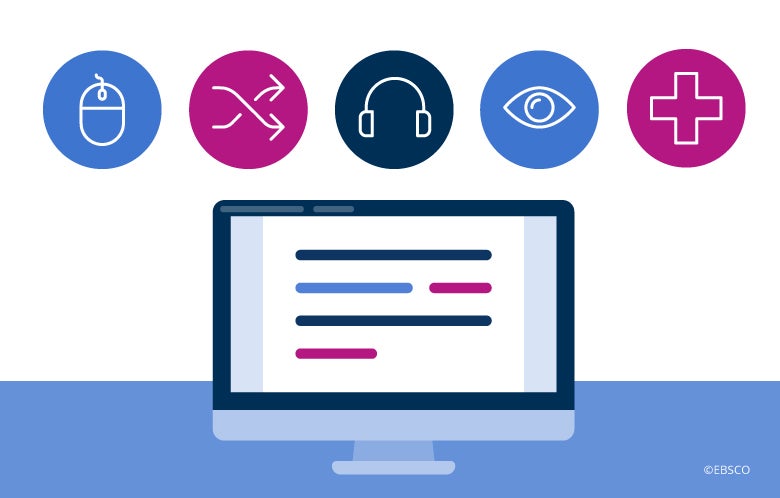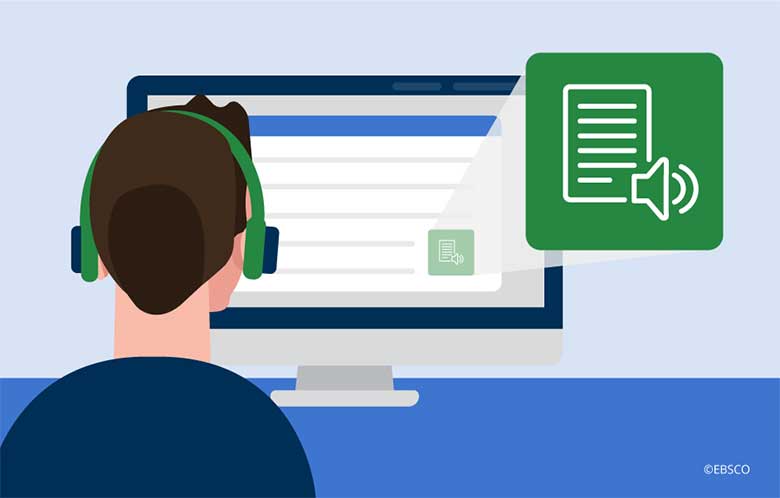As accessibility regulations continue to be reinforced in libraries worldwide, vendors need to ensure their standards are in line with accessibility guidelines and best practices. EBSCO Information Services (EBSCO) Senior Product Manager Rob Smith shares EBSCO’s approach to accessibility.
Can you speak to EBSCO’s accessibility approach and process?
EBSCO understands the importance of keeping accessibility in mind throughout the product development lifecycle. This understanding starts with EBSCO’s designers and product managers and carries through to software developers. In previous accessibility blog posts, we discussed the importance of identifying accessibility user personas and how different teams use personas. We also conduct accessibility training in-house and occasional training or consulting with third parties, such as Deque Systems and The Carroll Center for the Blind.
EBSCO’s philosophy for design and development is to make features equally available to all users by following accessibility standards and usability best practices. We try to avoid separate “accessibility modes” that need to be enabled in user or administrative settings within our own applications, which adds an extra barrier for users and makes the separate features harder to maintain.
We also use tools in our development and testing process that help with accessibility. We use axe in testing and build processes to catch the portion of accessibility issues that are easily found by automated tests. For cases that can’t be easily automated, we use manual assistive tools like screen readers or create more sophisticated automated tests. We previously covered the perspective of two of our developers in a Q&A with an accessibility specialist developer and a recap of the CSUN conference.
What is EBSCO’s auditing process?
EBSCO works with third party auditors to evaluate our products on a regular basis. Currently, we are working with Deque Systems and The Carroll Center for the Blind. Our current auditing standard is WCAG 2.1 level AA. EBSCO benefits from the expertise these vendors bring to the process and our users and customers benefit from knowing we are working with trusted third parties. Our VPAT results reflect outputs from our auditing and internal testing process.
How does EBSCO manage accessibility within third-party content?
Content is a challenging area for an aggregator like EBSCO. We encourage our publisher partners to follow accessibility standards and work to make the most use of content features beneficial to accessibility. Delivering content in formats like HTML and EPUB is something we prioritize, as these formats are more resilient and work better with assistive technology. As with our user interfaces, we aim to provide an equal experience to all users, rather than a separate “accessible” experience.
We are in the process of implementing large-scale automated accessibility checks for our content. These checks do not catch everything, but they give us an idea of the direction of accessibility for content. This process is already in place for our EPUB e-book content, and we are looking to expand it to HTML and PDF content for journals and e-books. We share this data with publishers to help them understand areas for improvement.
EBSCO’s philosophy for design and development is to make features equally available to all users by following accessibility standards and usability best practices.
EBSCO’s philosophy for design and development is to make features equally available to all users by following accessibility standards and usability best practices.
A major challenge is the large backfile of content created by our range of publishers before accessibility was at the forefront. EBSCO is currently working with publishers to determine the best way to deal with this content. In the interim, we can provide remediated content for users with disabilities upon request, free of charge.
Our e-books team is leading the way on content accessibility and recently started a partnership with Benetech, the nonprofit organization famous for creating BookShare, to help influence publishers toward greater accessibility.
You mentioned The Carroll Center for the Blind. Tell us a little bit about this partnership.
EBSCO is in its second year of a partnership with The Carroll Center for the Blind, headquartered in Newton, Massachusetts. The Carroll Center provides expertise and experience that is invaluable to our design and development process. This partnership allows us to go beyond strict compliance and consider what users of varying abilities actually want or need in a user experience.
Are there any new EBSCO products on the horizon that demonstrate our commitment to accessibility?
EBSCO has two products that have recently launched or are in a beta stage — the next generation EBSCO Discovery Service™ (EDS) and EBSCO’s new mobile app. We are building in accessibility measures from development and are extensively testing these products for WCAG 2.1 AA compliance, and have received feedback from our usability partners and beta customers on the accessible user experience.
Deque will be creating the VPAT for our next-generation EDS platform based on a full WCAG 2.1 audit, aiming to provide greater confidence for buyers that the product has been fully vetted by a trusted third party.
EBSCO’s mobile app offers several accessibility enhancements and will soon include a new e-book reader.
Who can we contact with questions on accessibility as it relates to EBSCO products and services?
The EBSCO Accessibility team is passionate about accessibility and is interested in feedback on our products. We encourage customers to contact us at accessibility@ebsco.com.
EBSCO strives to build accessibility into our products and processes. We evaluate our products based on the Web Content Accessibility Guidelines (WCAG) and the related Section 508 and EN 301 549 regulations in the US and EU. Most EBSCO products are partially conformant with WCAG 2.1 level AA.
For more information about EBSCOhost® and EBSCO Discovery Service, please see our detailed accessibility statement. EBSCO is in the process of posting the Voluntary Product Accessibility Template (VPAT) and accessibility statements for all products to EBSCO Connect for easy access.


